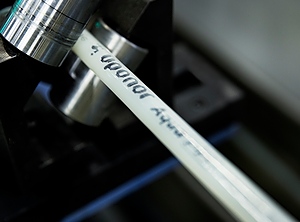UPONOR
Joint project demonstrates chemical recycling of PEX pipes / High yields achieved / Partners assess further opportunities
 The project is among the first to chemically recycle PEX (Photo: Uponor) |
A collaboration between Uponor (Vantaa, Finland; www.uponorgroup.com), Neste (Espoo, Finland; www.neste.com), WasteWise (Nokia, Finland; www.wastewise.fi), and Borealis (Vienna, Austria; www.borealisgroup.com) has successfully deployed a chemical recycling process to break down waste cross-linked polyethylene (PEX) pipes back into feedstock that can be used to remake new pipes.
The partners said they believe the project, which they managed to complete in little more than six months, is among the first to chemically recycle PEX. The project used WasteWise’s pyrolysis route to liquefy the industrial waste from Uponor’s pipe production, creating an oil-like intermediate that Neste said it upgraded in its refinery in Porvoo, Finland.
Related: Borealis expands PEX production in Sweden
Borealis said it fed the raw material into its steam cracker, polymerising it into PE, which Uponor used to create new PEX pipes that can once again be used for heating, plumbing, and cooling applications, and drinking water systems. The chain is traceable via ISCC Plus (www.iscc-system.org) certified mass balancing.
“The successful project demonstrates not only that recycling of PEX is possible via chemical recycling, but it also shows that it’s actually possible with high yields: some 80% of the PEX production waste can be added back to the circle,” said WasteWise managing director and partner Kaisa Suvilampi.
Mercedes Alonso, executive vice president, renewable polymers and chemicals at Neste, added: “It’s pushing the technology from the promise to the delivery phase. Further, it shows the importance of bringing the right partners together to cooperate.”
Related: Neste’s vision for chemical recycling
The partners now plan to evaluate further opportunities for cooperation, which aside from broadening the waste-material pool may also include higher recycled volumes. Uponor’s chief technology officer Thomas Fuhr said its new long-term goal is to use 100% of its PEX waste as raw material through closed loop recycling.
The partners said they believe the project, which they managed to complete in little more than six months, is among the first to chemically recycle PEX. The project used WasteWise’s pyrolysis route to liquefy the industrial waste from Uponor’s pipe production, creating an oil-like intermediate that Neste said it upgraded in its refinery in Porvoo, Finland.
Related: Borealis expands PEX production in Sweden
Borealis said it fed the raw material into its steam cracker, polymerising it into PE, which Uponor used to create new PEX pipes that can once again be used for heating, plumbing, and cooling applications, and drinking water systems. The chain is traceable via ISCC Plus (www.iscc-system.org) certified mass balancing.
“The successful project demonstrates not only that recycling of PEX is possible via chemical recycling, but it also shows that it’s actually possible with high yields: some 80% of the PEX production waste can be added back to the circle,” said WasteWise managing director and partner Kaisa Suvilampi.
Mercedes Alonso, executive vice president, renewable polymers and chemicals at Neste, added: “It’s pushing the technology from the promise to the delivery phase. Further, it shows the importance of bringing the right partners together to cooperate.”
Related: Neste’s vision for chemical recycling
The partners now plan to evaluate further opportunities for cooperation, which aside from broadening the waste-material pool may also include higher recycled volumes. Uponor’s chief technology officer Thomas Fuhr said its new long-term goal is to use 100% of its PEX waste as raw material through closed loop recycling.
20.02.2023 Plasteurope.com [252197-0]
Published on 20.02.2023
